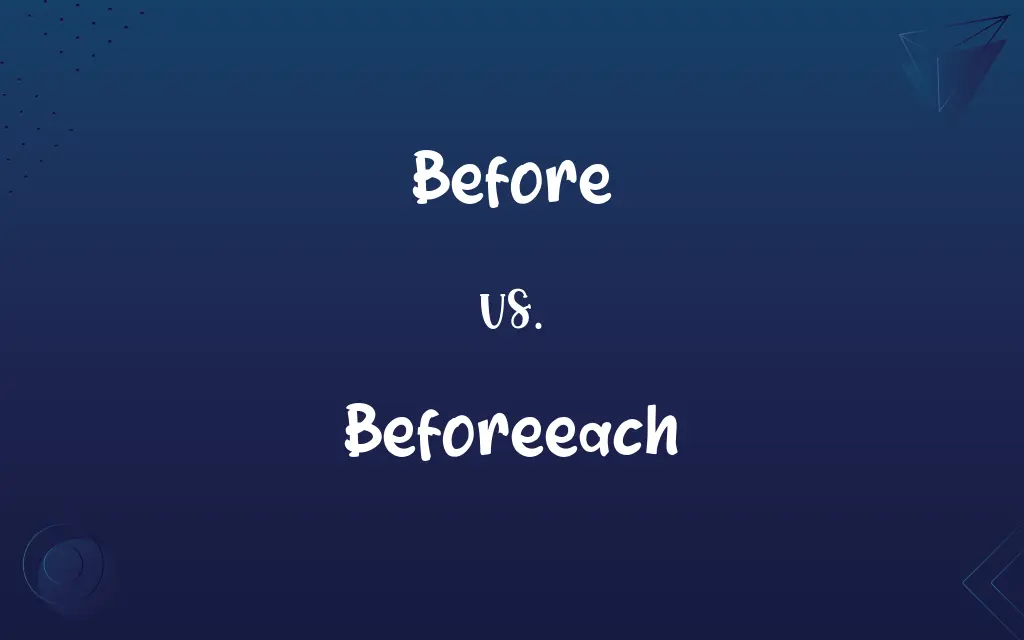Before vs. Beforeeach: Know the Difference

By Shumaila Saeed || Published on February 23, 2024
"Before" is a preposition or conjunction meaning earlier than a specific time or event. "BeforeEach" is a programming term, used in automated testing, to define a function or action that runs before each test in a suite.

Key Differences
"Before" is used in general language to indicate a time or sequence preceding another event. "BeforeEach," in contrast, is specific to programming, particularly in test frameworks, signifying a command that executes a specific set of instructions before every test case.
Shumaila Saeed
Feb 23, 2024
In everyday use, "before" sets the temporal context for actions, events, or conditions. "BeforeEach," however, is a functional element in automated testing, ensuring that certain conditions are set or reset before the execution of each individual test in a suite.
Shumaila Saeed
Feb 23, 2024
The term "before" is versatile, applicable in various contexts, including time, sequence, and preference. "BeforeEach" has a narrow scope, used exclusively in programming for initializing or setting up test environments in a consistent state for each test.
Shumaila Saeed
Feb 23, 2024
"Before" fits into the syntactic structure of sentences in natural language. "BeforeEach" is a keyword in programming languages like JavaScript (within testing frameworks like Jest or Mocha), and its usage follows the syntax and rules of the specific programming language.
Shumaila Saeed
Feb 23, 2024
The interpretation of "before" depends on its context in a sentence, conveying the idea of precedence or priority. "BeforeEach" has a specific purpose in programming: to maintain test integrity by ensuring a clean state for each test execution.
Shumaila Saeed
Feb 23, 2024
ADVERTISEMENT
Comparison Chart
Usage
General language for indicating precedence
Programming, specifically in automated testing
Shumaila Saeed
Feb 23, 2024
Context
Time, sequence, preference
Setting up conditions before each test case
Shumaila Saeed
Feb 23, 2024
Syntax
Part of natural language structure
Programming keyword with specific syntax
Shumaila Saeed
Feb 23, 2024
Function and Purpose
Sets temporal or sequential context
Ensures consistent test environment
Shumaila Saeed
Feb 23, 2024
ADVERTISEMENT
Before and Beforeeach Definitions
Before
Establishing a condition that needs to happen first.
Read the instructions before starting the test.
Shumaila Saeed
Jan 20, 2024
Beforeeach
Ensures each test starts with specific conditions.
BeforeEach function sets up a mock environment for our tests.
Shumaila Saeed
Jan 20, 2024
Beforeeach
A feature in testing frameworks like Jest.
In Jest, BeforeEach helps us prepare test dependencies.
Shumaila Saeed
Jan 20, 2024
Before
Indicates an event occurring earlier than another.
Finish your homework before dinner.
Shumaila Saeed
Jan 20, 2024
ADVERTISEMENT
Beforeeach
Executes a set of instructions for every test.
BeforeEach block logs a message before every test for tracking.
Shumaila Saeed
Jan 20, 2024
Before
Used to describe the order of actions or events.
We must plan the meeting before making any announcements.
Shumaila Saeed
Jan 20, 2024
Beforeeach
In programming, initializes conditions before each test case.
BeforeEach, we reset the database for a clean state.
Shumaila Saeed
Jan 20, 2024
Before
Referring to a time in the past.
The castle was built before the 18th century.
Shumaila Saeed
Jan 20, 2024
Beforeeach
Used for setting states that assist in debugging tests.
BeforeEach, we enable logging to trace test executions.
Shumaila Saeed
Jan 20, 2024
Repeatedly Asked Queries
What is "BeforeEach" used for in programming?
It's used to execute code before each test in a suite.
Shumaila Saeed
Feb 23, 2024
How often is "before" used in everyday language?
Very frequently, in various contexts.
Shumaila Saeed
Feb 23, 2024
Can "before" be used in all types of sentences?
Yes, it's versatile in different sentence structures.
Shumaila Saeed
Feb 23, 2024
What does "before" indicate?
It indicates an event or time preceding another.
Shumaila Saeed
Feb 23, 2024
Does "BeforeEach" only relate to testing?
Yes, primarily in automated testing.
Shumaila Saeed
Feb 23, 2024
Does "before" have multiple meanings?
Yes, it can denote time, sequence, or preference.
Shumaila Saeed
Feb 23, 2024
Is "BeforeEach" specific to a programming language?
It's specific to testing frameworks, not languages.
Shumaila Saeed
Feb 23, 2024
What's the main purpose of "BeforeEach"?
To set up a consistent test environment.
Shumaila Saeed
Feb 23, 2024
Is "BeforeEach" a command or a function?
It's a function in test frameworks.
Shumaila Saeed
Feb 23, 2024
Can "BeforeEach" be used outside of testing?
Typically, no, it's specific to test setup.
Shumaila Saeed
Feb 23, 2024
Can "before" be used in formal writing?
Yes, it's suitable for both formal and informal use.
Shumaila Saeed
Feb 23, 2024
Is "BeforeEach" beginner-friendly in programming?
It may require some understanding of test frameworks.
Shumaila Saeed
Feb 23, 2024
Can "before" denote preference?
Yes, it can indicate a preference or priority.
Shumaila Saeed
Feb 23, 2024
Is "before" a preposition or conjunction?
It can be both, depending on usage.
Shumaila Saeed
Feb 23, 2024
Can "before" be used in historical contexts?
Yes, to reference events in the past.
Shumaila Saeed
Feb 23, 2024
Does "BeforeEach" affect all tests in a suite?
Yes, it runs before each test in a suite.
Shumaila Saeed
Feb 23, 2024
How does "BeforeEach" improve testing?
By ensuring each test starts with a clean slate.
Shumaila Saeed
Feb 23, 2024
In which testing frameworks is "BeforeEach" found?
Jest, Mocha, and similar JavaScript testing frameworks.
Shumaila Saeed
Feb 23, 2024
Is "before" easy to understand in sentences?
Generally, yes, as it's a common word.
Shumaila Saeed
Feb 23, 2024
Share this page
Link for your blog / website
HTML
Link to share via messenger
About Author
Written by
Shumaila SaeedShumaila Saeed, an expert content creator with 6 years of experience, specializes in distilling complex topics into easily digestible comparisons, shining a light on the nuances that both inform and educate readers with clarity and accuracy.








































































